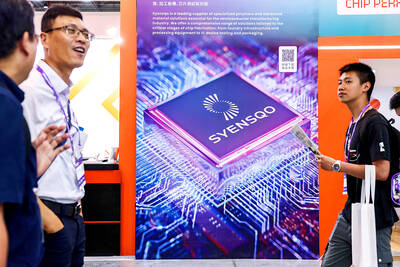Japan’s economy expanded at its fastest pace in a year in the first quarter, thanks in part to a leap-year consumption boost, but analysts said the rebound was not strong enough to dispel concerns over a contraction in this quarter.
With private consumption making only a feeble recovery from last quarter’s slump, the data keeps alive market expectations that Japanese Prime Minister Shinzo Abe would delay a scheduled sales tax hike next year, analysts said.
The world’s third-largest economy expanded by an annualized 1.7 percent in the January-to-March quarter, much more than a median market forecast for a 0.2 percent increase and rebounding from a 1.7 percent contraction in the previous quarter, Japanese Cabinet Office data showed yesterday.
Analysts had worried that the January-to-March period would not produce enough growth to avert recession — defined as two straight quarters of contraction — after stripping out the estimated boost from the leap year.
“Taking into account the effects of the extra day from the leap year, which pushed up the quarter-on-quarter growth rate by 0.3 percentage points, growth is not as strong as the headline number shows,” Mizuho Research Institute senior economist Hidenobu Tokuda said.
“The GDP data will likely press Abe to decide to delay a planned sales tax hike next year and to roll out additional fiscal stimulus worth at least ¥5 trillion [US$45.76 billion]. I also expect the Bank of Japan to ease policy further in July given weak growth and tame inflation,” he added.
Following the data, Koichi Hamada, an emeritus professor of economics at Yale University and key economic adviser to Abe, reiterated his opposition to the planned tax hike, which he told lawmakers would cause “quite a confusion.”
Japanese Chief Cabinet Secretary Yoshihide Suga told a news conference after the data that Japan is making steady progress toward beating deflation, but private consumption continues to be weak with the effect of a sales tax hike in 2014 remaining.
Private consumption, which makes up 60 percent of GDP, rose 0.5 percent, more than double the median market forecast, as households boosted spending on televisions, food and beverages, and recreation, the data showed.
However, the rebound failed to make up for a 0.8 percent drop in the previous quarter.
The economy contracted in the final quarter of last year as slow wage growth hurt private consumption, while exports felt the pinch from sluggish emerging market demand and the pain of a strong yen.
Tokyo’s benchmark share index closed marginally lower yesterday, ending a two-day winning streak.
The Nikkei 225 edged down 8.11 points to 16,644.69, while the broader Topix index of all first-section shares was up 2.53 points at 1,338.38.

SEMICONDUCTOR SERVICES: A company executive said that Taiwanese firms must think about how to participate in global supply chains and lift their competitiveness Taiwan Semiconductor Manufacturing Co (TSMC, 台積電) yesterday said it expects to launch its first multifunctional service center in Pingtung County in the middle of 2027, in a bid to foster a resilient high-tech facility construction ecosystem. TSMC broached the idea of creating a center two or three years ago when it started building new manufacturing capacity in the US and Japan, the company said. The center, dubbed an “ecosystem park,” would assist local manufacturing facility construction partners to upgrade their capabilities and secure more deals from other global chipmakers such as Intel Corp, Micron Technology Inc and Infineon Technologies AG, TSMC said. It

EXPORT GROWTH: The AI boom has shortened chip cycles to just one year, putting pressure on chipmakers to accelerate development and expand packaging capacity Developing a localized supply chain for advanced packaging equipment is critical for keeping pace with customers’ increasingly shrinking time-to-market cycles for new artificial intelligence (AI) chips, Taiwan Semiconductor Manufacturing Co (TSMC, 台積電) said yesterday. Spurred on by the AI revolution, customers are accelerating product upgrades to nearly every year, compared with the two to three-year development cadence in the past, TSMC vice president of advanced packaging technology and service Jun He (何軍) said at a 3D IC Global Summit organized by SEMI in Taipei. These shortened cycles put heavy pressure on chipmakers, as the entire process — from chip design to mass

People walk past advertising for a Syensqo chip at the Semicon Taiwan exhibition in Taipei yesterday.

NO BREAKTHROUGH? More substantial ‘deliverables,’ such as tariff reductions, would likely be saved for a meeting between Trump and Xi later this year, a trade expert said China launched two probes targeting the US semiconductor sector on Saturday ahead of talks between the two nations in Spain this week on trade, national security and the ownership of social media platform TikTok. China’s Ministry of Commerce announced an anti-dumping investigation into certain analog integrated circuits (ICs) imported from the US. The investigation is to target some commodity interface ICs and gate driver ICs, which are commonly made by US companies such as Texas Instruments Inc and ON Semiconductor Corp. The ministry also announced an anti-discrimination probe into US measures against China’s chip sector. US measures such as export curbs and tariffs